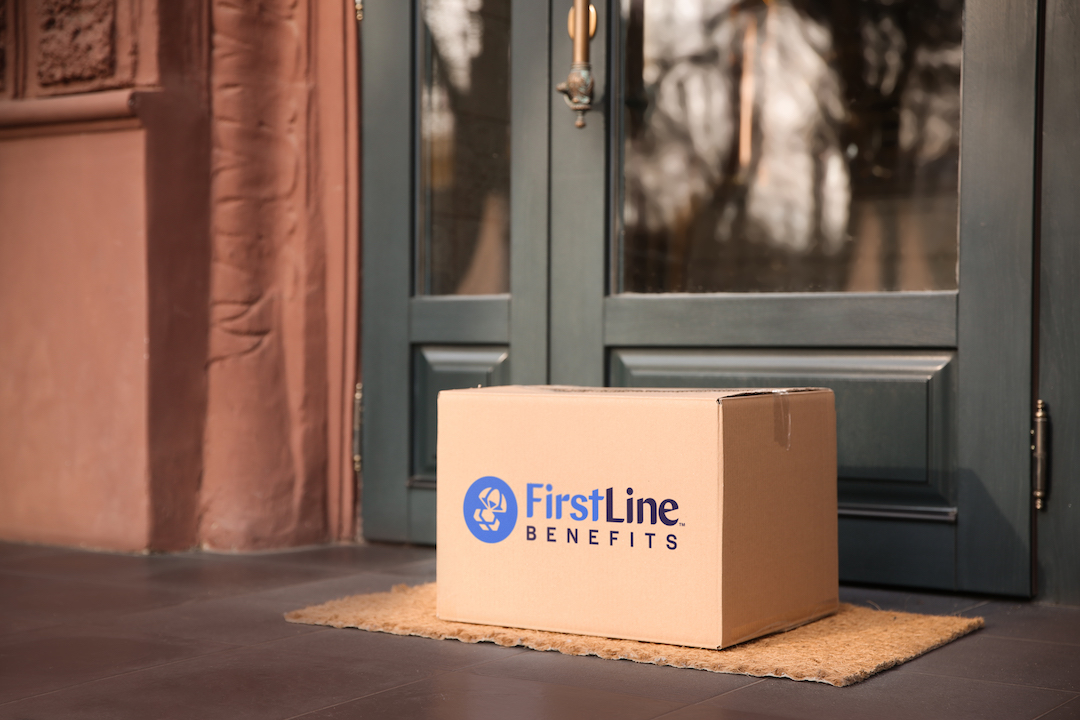Brand Story – How FirstLine Benefits helps employers and health insurers promote wellbeing and stand out.
Traditional health care—adept at identifying morbidities and responding with medical interventions—is just the beginning of health care’s potential impact, according to FirstLine Benefits. The supplemental care provider delivers proactive over-the-counter (OTC) care options that help health plans cut costs, health insurers and employers differentiate themselves, and consumers lead healthier lives.
Serving members since 2004, FirstLine Benefits enables organizations to provide OTC care and grocery benefits to its consumers, eclipsing standard health care offerings. Individuals can order from over 750 products, from Tylenol to Band-Aids. Thanks to the company’s strong manufacturer relationships, that list includes in-demand items made scarce by supply chain issues.
What began as an OTC care platform has since blossomed into a suite of innovative products.
“We found that people appreciated when we made suggestions and bundled products together. So, we started to play around with that more,” recalls Sana Hashmi, vice president of FirstLine Benefits. “We realized there’s value in putting a thoughtful curated kit together that fits a need.”
 Sana Hashmi, vice president of FirstLine Benefits
Sana Hashmi, vice president of FirstLine Benefits
During the COVID-19 pandemic, the company mailed out over 200,000 care kits with preventative items, such as masks and hand sanitizer, on behalf of a health care client. A burst of positive social media activity followed, with recipients posting photos of their kits and letters of appreciation.
“When you have a great experience at the doctor, you’re probably not going to write about it. But if your health plan or employer sends you a curated kit with really nice things you can use, you’re more likely to engage and provide feedback,” Hashmi adds. “This leads to better engagement and retention.”
Curated, home-delivered boxes already exist in other industries, like food and fashion. FirstLine Benefits’ preventative care kits, called Ready Sets™, bring that same client-centric approach to health care. Turnkey Ready Sets let organizations easily offer tailored, white-labeled care kits, including touches like a welcome letter and helpful education on reaching the kit-specific goal.
Each care kit reflects the daily, practical needs associated with a specific consumer goal, while supporting the strategic goals of insurers and employers. Importantly, contents can be quickly adapted to changing public health needs and policies.

“Research shows that small items can make a massive difference, and that’s something the public witnessed during COVID. Suddenly, the power of hand sanitizers and face masks was understood,” she says. “I think that during this time people were shocked to learn that not everyone had money to buy these items.”
After witnessing a growing public appetite for proactive management, FirstLine Benefits expanded into new areas of need that offered the potential to innovate.

Three lines of Ready Sets are currently available: Ready Set Prevent for cold and flu season features face masks, hand sanitizer, vitamin C and other items that help prevent the spread of illness. Ready Set Begin includes portion containers, a pedometer, a digital scale, educational resources and additional tools to aid in weight management and active living. Ready Set Steady outfits the home for independent living to prevent trip-induced injuries.
Next in the pipeline is a kit for new moms and another organized around seasonal stress—such as the holidays.
“When you start to go outside traditional hospital benefits, your employees see that you care about them holistically,” Hashmi explains. “When you offer benefits like this, individuals get excited to come to work, and you attract more talent. Everyone offers medical and dental, so you differentiate yourself as an employer by offering over-the-counter care that addresses what people need.”
For example, imagine being sent home from the hospital to recover from a hip replacement. At the same time, a Ready Set Steady box arrives at the door. It includes a night-light, shower stool and anti-skid socks—all tools that prevent reinjury during this vulnerable period.
OTC benefits remove barriers between consumers and OTC care, providing them an appropriate, responsive alternative to immediately visiting the hospital or emergency room. Consumers are more likely to choose economical options when OTC items are covered by their plan and purchasable online or within pharmacies using a pre-loaded debit card.
A FirstLine Benefits study confirmed that supplemental programs can significantly cut costs for health plans. It found that when a specific plan integrated OTC benefits, hospital admissions and ER visits dropped by 39.8 and 26.4 percent, respectively. Avoidable admissions fell by 47.2 percent and the readmission rate decreased by 41.4 percent. These changes saved the 20,000-member plan featured in the study an estimated total of $10.5 million annually.
The only measurement that saw an increase? Member retention—up 8.6 percent.
The data collected during Ready Set campaigns further strengthens an organization’s engagement strategy. FirstLine Benefits drafts bespoke reports that offer insight into member engagement and inform steps toward further optimization.
Ready Sets will continue evolving, responding to individuals’ dynamic needs and removing barriers to life-changing OTC care.
“Most people don’t spend 80 percent of the day in hospitals. I hope that one day health plans build products with proactive health in mind: Do new parents have access to diapers and formula? Do my clients have access to food?” Hashmi concludes. “Let’s build products with those things in mind first.
Brand stories are paid content articles that allow Oregon Business advertisers to share news about their organizations and engage with readers on business and public policy issues. The stories are produced in house by the Oregon Business marketing department. For more information, contact associate publisher Courtney Kutzman.


